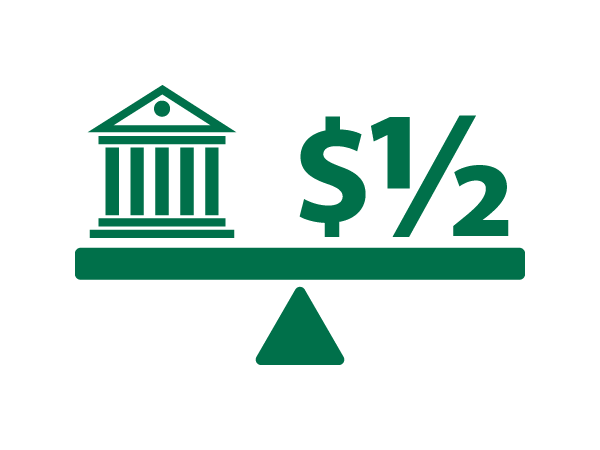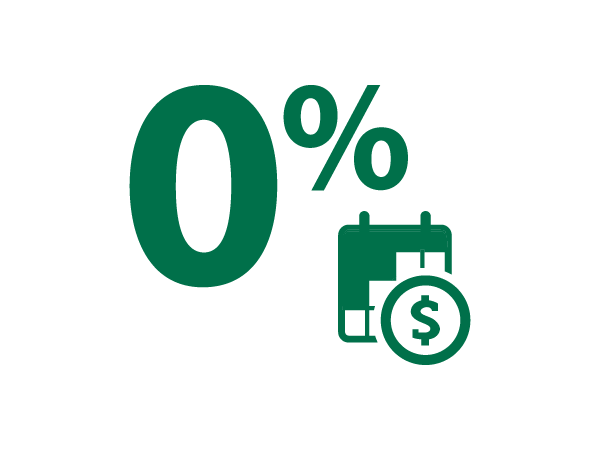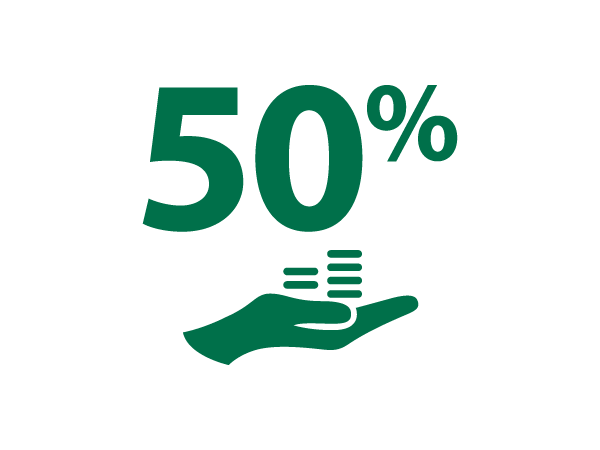If you need a student loan, we can help you through the process. It’s a good choice to pay for tuition and school expenses. Especially if you don’t have grants or scholarships to cover the costs.
Loans can be subsidized (you don’t have to pay interest until you graduate) or unsubsidized (interest starts accruing as soon as you take out the loan).
Lots of Delta students get loans to pay for college. And at Delta, with our low tuition rates, you'll be paying back a lot less than your friends attending a university.
-
 We're here to help
We're here to helpWe want you to reach your dreams. And we're here to help you get there. Whether that's helping you through the loan process, or something else.
Types of Loans
Student loans, unlike grants and work-study, are borrowed money from the Department of Education that must be repaid with interest. So before you take out a student loan, think about the amount you’ll repay over the years. Make sure to learn the basics and manage your loan debt. If you have any questions, we're here to help!
The Federal Direct Subsidized and Unsubsidized Loan programs carry both annual and cumulative (lifetime) limits. Your FAFSA Submission Summary (FSS) lists your cumulative loans, but it is important that you also keep records of all your loan transactions.
The Direct Subsidized Loan enables undergraduate or graduate students who show financial need to borrow money to help pay for their educational expenses. Generally interest does not accrue until the student graduates, withdraws from school or drops below half-time.
The Direct Unsubsidized Loan enables undergraduate or graduate students to borrow money to pay for their educational expenses regardless of financial need. Interest accrues on an unsubsidized loan while a student is in school. The student may choose to pay the interest while in school to avoid paying interest on interest.
Before requesting Federal Student Loans, you must first complete the FAFSA.
Once you've completed the FAFSA, you will need to complete a Master Promissory Note and Loan Entrance Counseling for undergraduates at Federal Student Aid. You will need your FSA ID.
Next, complete the following steps within your Delta Financial Aid Self-Service account:
- Log in to Student Self-Service.
- Select Financial Aid.
- Click on "Request a New Loan" from the financial aid drop down menu
- Must be enrolled in a minimum of 6 credits.
- Must maintain satisfactory academic progress.
- The Direct Subsidized Loan enables undergraduate or graduate students who show financial need to borrow money to help pay for their educational expenses. Generally, interest does not accrue until you graduate, withdraw from school or drop below half-time. If you receive Direct Stafford Subsidized Loans for the first time on or after July 1, 2013, you may start incurring interest while in school.
- Interest accrues on an unsubsidized loan while you are in school. You may choose to pay the interest while in school or capitalize the interest.
Interest rates will be a “variable-fixed” rate. This means you may receive a new rate with each new loan, but the rate will be fixed for the life of the loan. New interest rates will be set each July 1 through the following June 30 by the Department of Education and can be found at the Federal Student Aid website on the Interest Rates and Fees page.
The loan award amount shown on your Offer Letter is the gross amount. Federal Direct Loans require an origination fee, which is taken out prior to being received by Delta College. Current origination fees can be found at the Federal Student Aid website on the Interest Rates and Fees page.
| Student Level & Dependency Status | Maximum Stafford (Subsidized & Unsubsidized) | Maximum Subsidized |
|---|---|---|
| Dependent Freshman | $5,500 | $3,500 |
| Dependent Sophomore | $6,500 | $4,500 |
| Independent Freshman | $9,500 | $3,500 |
| Independent Sophomore | $10,500 | $4,500 |
| Student Level & Dependency Status | Maximum Stafford (Subsidized & Unsubsidized) | Maximum Subsidized |
|---|---|---|
| Dependent Undergraduate | $31,000 | $23,000 |
| Independent Undergraduate | $57,500 | $23,000 |
Federal Direct Parent Plus Loans are borrowed by a parent through the Department of Education to help pay for the cost of their child’s education. The loan is paid back to the lender by the parent. The parent is generally expected to start making payment on the loan once the funds are fully disbursed to the school. However, a parent can request a deferment while their student is enrolled at least half-time. Interest begins to accrue at time of disbursement and will be capitalized if interest payments are not made.
Your parent needs to log into Federal Student Aid and choose Apply for a Parent PLUS Loan from the APPLY FOR AID option.
- You must complete a FAFSA and be considered a dependent student as defined by the application.
- You must be enrolled at least half-time (six or more credits).
- You must be maintaining satisfactory academic progress in regards to GPA, completion rate, and eligibility based on the students program of study.
- Your parent cannot have adverse credit history or be in default on any Federal Loans. However, if your parent has extenuating circumstances, visit the PLUS Loan Eligibility page for more information.
- They must be your biological parent, adoptive parent or stepparent.
Interest rates will be a “variable-fixed” rate. This means you may receive a new rate with each new loan, but the rate will be fixed for the life of the loan. New interest rates will be set each July 1 through the following June 30 by the Department of Education and can be found at the Federal Student Aid website on the Interest Rates and Fees page.
The loan award amount shown on your Offer Letter is the gross amount. Federal Direct PLUS Loans require an origination fee, which is taken out prior to being received by Delta College. Current origination fees can be found at the Federal Student Aid website on the Interest Rates and Fees page.
The maximum amount your parent can borrow is equal to the cost of attendance minus any other financial assistance you are receiving.
You may complete a Delta College Federal Stafford Loan Request and note that they would like a PLUS replacement loan. With proof of PLUS denial, you may be able to borrow up to an additional $4,000 per year in unsubsidized loans.
Delta College is a community college and does not offer graduate degree programs; therefore, students are not eligible to apply for the Federal Direct Plus Graduate and Professional Degree loans.
Prior to applying for an alternative educational loan, we strongly encourage you to complete the FAFSA. Doing so, allows you to be considered for grants, as well as for Federal Direct student loans.
Federal Direct loans do not require a credit check or co-signer and offer fixed interest rates that are often more advantageous than alternative educational loans.
Alternative educational loans may be available as an option for students whose program of study is not eligible for Federal financial aid, students who are not maintaining standards of academic progress, or those who show remaining need after all other financial aid is subtracted from their college's cost of attendance. The combination of alternative loans and Federal, State and institutional aid and resources you are awarded cannot exceed the cost of attendance. Alternative loans can only be used towards academic credit classes and some lenders require at least half-time enrollment.
Below is a link to some private lending institutions that have offered alternative educational loans to Delta College students in the past.
Lenders are required to provide certain disclosures to an applicant when applying for a private loan. To see these disclosures please view the Truth in Lending Act as written into law. This law is designed to safeguard consumers by requiring lenders to provide terms and conditions on private financial transactions. When applying for an alternative loan, your lender should be providing you with the information outlined in this act.
The Higher Education Opportunity Act of 2008 requires that before a private educational lender may finalize a private education loan for a student in attendance at an institution of higher education, the private lender must obtain the signed, completed self-certification form. Most lenders will provide this form directly to students. If your lender does not, you can obtain a Private Education Loan Applicant Self-Certification form at the Delta College Financial Aid Office.
Student loan disbursements
- After a Federal Direct or Parent Plus loan has been certified by Delta College, you will receive notification by email directing you to access your Financial Aid Self-Service My Awards page for approved loan type and amount.
- You will also receive information regarding the Federal Direct and/or Parent PLUS Loan approval from the Federal government. This letter will include the approved loan amount and anticipated dates when the funds will be released to Delta College for processing.
- Attendance will be verified before loan disbursement(s) will be released to you and adjusted if necessary.
- Loans will be disbursed in two installments per semester.
- The first disbursement of loan funds will be released approximately 8 weeks into the semester after classes have started and the student is enrolled in 6 or more credit hours.
- The second disbursement will occur near the mid-point of the semester after classes have started and you are enrolled in 6 or more credit hours.
- Your tuition and fees may be charged up to the amount of your approved loan less origination fees. A loan will hold your classes until the funds are received only if you are enrolled in 6 credits, waitlists do not count. If a balance remains after the charges have been deducted from the loan, the difference must be paid by payment deadline.
- You may charge books against a student loan if a credit balance remains after tuition and fees have been paid.
- You are notified via your Delta email account when your loan funds are received by
Delta College and prior to the release of these funds. Loan balance checks are mailed
by the Student Billing Office to your current home address on file with the college.
Refunds of loan proceeds will be given to you once your account has been paid in full. - If your account is not paid in full by the time registration begins for the next semester, Delta College will place a hold/freeze on your account until the tuition and fee charges have been paid in full.
Student Loan Policies
A completed FAFSA must be received before a loan request can be processed, and students must be enrolled in a minimum of six credits to receive loan funds. Classes that are waitlisted do not count towards enrollment levels.
Federal guidelines for eligibility are applicable to loans, similar to grants and as stated in the Financial Aid Policies such as Attendance and Standards of Academic Progress. A Master Promissory Note and Entrance Loan Counseling for undergraduates must be completed before a loan request can be processed. Parent PLUS loans require the parent to complete a Master Promissory Note, but loan counseling is not required.
Federal loans awarded prior to the start of a semester will be based upon the number of credits indicated by the student request. Federal loans are disbursed to students in two equal installments each semester, the first being applied after the 30-day mark of the semester and the second after the mid-point. Prior to loan disbursements, loans may be reduced if actual enrollment levels are lower than indicated on the request form. Disbursements will be canceled if students are not enrolled in a minimum of six credits and any remaining balance will become the student’s responsibility to pay in full.
Students with Federal loans are granted a deferment of repayment with continuous enrollment of six or more credits, and are granted a grace period of six months to begin repayment once a student graduates or drops below six credits. The grace period will begin immediately once a student drops below six credits. Exit Loan Counseling is also required for students once the grace period begins.
Delta College will not authorize late disbursements after the end of the loan period.
When reviewing a student’s aggregate indebtedness, Federal loans from Delta, as well as other institutions will be considered. Student can access their loan and aid records through Federal Student Aid. A Federal Student Aid (FSA) username and password are required to access the site.
Please visit the page below for more information on the Pell Recalculation Date, Standards of Academic Progress and other financial aid policies:
Delta college loan code of conduct
Delta College recognizes that ensuring the integrity of the student financial aid process is critical to providing fair and affordable access to higher education in Michigan. Therefore, these guidelines are designed to avoid any potential for a conflict of interest between Delta College and students or their parents in the student financial aid process. Accordingly, the College shall adhere to the following principles in the College’s financial aid operations:
No employee of the College shall accept a gift or anything of more than nominal value on his or her behalf or on behalf of another person or entity from any Lending Institution. The term gift means any gratuity, favor, discount, cash, stocks, gifts, entertainment, expense-paid trips, or other item having a monetary value of more than a de minimus amount. Likewise, an individual should never receive payment or reimbursement from a Lending Institution for lodging, meals or travel to conferences or training seminars. However, an employee of the College may:
- Conduct non-College business with any Lending Institution and receive value in connection with such non-College business, so long as such value is not intended to influence the employee in conducting College business;
- Conduct College business and, receive value on behalf of the College that is unrelated to the student loan activities of the Lending Institution;
- Attend conferences and meetings of tax-exempt organizations that are funded or sponsored by more than one entity and, receive materials, refreshments, and other things of like value provided at such professional conferences and meetings; and,
- Hold membership in, serve on the board of or participate in the activities of any tax-exempt organization and, receive travel reimbursements and other things of like value from the tax-exempt organization for such activities.
- Receive entrance and exit counseling services provided to borrowers to meet the institution’s responsibilities for entrance and exit counseling as required by the HEA as long as the institution’s staff are in control of the counseling and specific lender’s product and services are not promoted.
No employee of the College who makes financial aid decisions for the College or who is employed in, supervises or otherwise has responsibility or authority over the College’s financial aid office shall receive any remuneration for serving as a member or participant of a student loan advisory board of a Lending Institution or any reimbursement of expenses for such service. Any employee of the College who serves as a member or participant of a Lending Institution board shall recuse himself or herself from any board discussions regarding the College’s financial aid operations.
The College shall not accept anything of value from any Lending Institution in exchange for any advantage or consideration provided to the Lending Institution related to its student loan activities, including but not limited to revenue-sharing, printing costs or below-cost computer hardware or software. Likewise, the College shall not allow any Lending Institution to:
- Staff the College’s financial aid office at any time; or
- Communicate with the College’s students or their parents in such a manner as to create the impression that the Lending Institution is an employee or agent of the College in connection with the College’s student financial aid operations, including through the use of mascots, logos, etc.
- Prohibits institutions from assigning, through award packaging or other methods, a first-time borrower’s loan to a particular lender or refuse to certify, or delay certification of, any loan based on the borrower’s selection of a particular lender or guaranty agency.
- Eliminates “opportunity pool loans” by prohibiting institutions from requesting or accepting any offer of funds for private educational loans in exchange for the institution of higher education providing the lender with a specified number of loans or loan volume, or a preferred lender arrangement for Title IV loans. This does not include any private loan that is guaranteed by an institution (i.e. a recourse loan).
- Provide revenue-sharing arrangements on Federal Family Educational Loan Program (FFELP) or Federal Direct loans.
Finally, the College shall not enter into any agreement with a Lending Institution to provide alternative (i.e., non-federal or “opportunity”) student loan programs if the provision of such alternative loan programs prejudices other students or parents.
If the College decides to promulgate a list or lists of preferred or lender choices for student loans or similar ranking or designation (“Preferred Lender List”), the selection of Lending Institutions for inclusion on the Preferred Lender List shall be based on the best interests of the College’s students and their parents without regard to the financial interests of the College. In addition, any Preferred Lender List shall clearly explain:
- Students and their parents are free to select the Lending Institution of their choice and will suffer no penalty imposed by the College from using a Lending Institution that is not a “preferred lender;”
- Students and their parents are not required to use any of the “preferred lenders;”
- Where to find information on other Lending Institutions for student loans;
- The College will promptly certify any loan from any Lending Institution selected by a borrower, in accordance with U.S. Department of Education regulations;
- The process the College utilized to select “preferred lenders,” including but not limited to the criteria used and the relative importance of such criteria;
- Where to find information on the competitive interest rates, terms, and conditions of federal loans;
- Where to find information on the interest rate, loan servicing or other benefits offered by “preferred lenders;” and,
- Where to find information on any agreements by “preferred lenders” to sell their loans to other Lending Institutions.
The College shall review any Preferred Lender List on an annual basis to determine that the information appearing on the list is accurate and that any Web site links are still viable.
Resources
We want to make sure you have enough information to make an informed decision when it comes to students loans. Here are a few resources that might help you along the way.
- Federal Student Aid
- Federal Student Loans Basics for Students
- Loan Simulator
- Official Cohort Default Rates for Schools
- Your Guide to Student Loan Repayment Plans
- Responsible Borrowing
You don't have to accept the entire amount of the loan you’re offered. Think smart. And, think ahead. If you don't really need what's been offered, you can save money in the long run and keep from paying more interest.

Less than half the cost of a public university, with the same quality education.

An interest-free tuition plan that spreads out your payments.

Half of Delta students receive some form of assistance.

